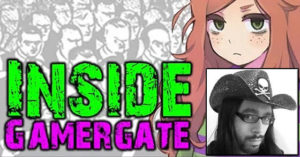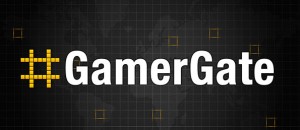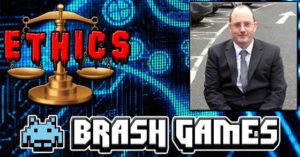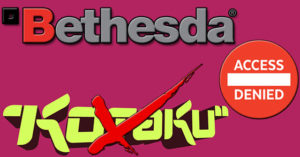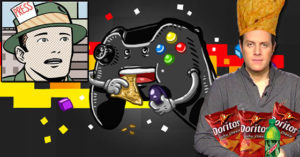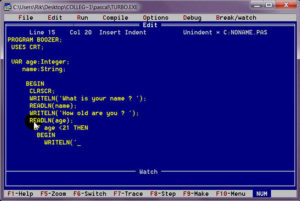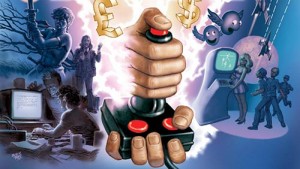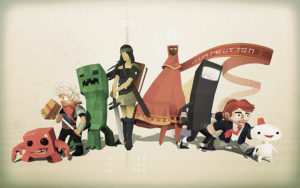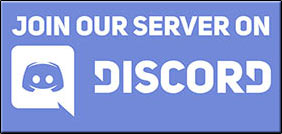Interview with video game veteran Troy Leavitt – #GamerGate, the games industry and old memories
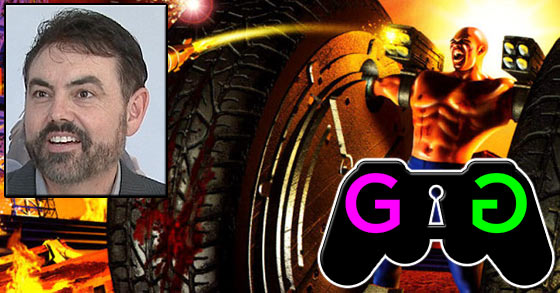
We (I and Jay) had the chance to do an interview with the video game veteran Troy Leavitt just recently. So we asked him about everything from his thoughts on #GamerGate, today’s games industry, Gaming journalism to how one should go about to get a job in the video game industry. So, without further ado. Please enjoy our interview with Leavitt =)
Robin TGG
As it’s something of a tradition for us to ask everyone whom we interview for a proper introduction of themselves, well, please go ahead and do so.
Leavitt
I’m a game developer who has been professionally making games for over two decades. In that time, I’ve worked in varying capacities on about 25 published titles. For the last dozen years, I worked for the Walt Disney Company. My last published titles include Disney’s Infinity where I worked as the Game Director on four different playsets: The Lone Ranger, The Avengers, Inside Out, and Finding Dory.
Even though I’ve been fortunate enough to make a career out of game development, I consider myself first and foremost a gamer. I have distinct memories of being in Junior High School and sneaking down to the local 7-11 to spend a few quarters that I had earned from my paper route on games like Galaga and Asteroids. My parents hated that I was “wasting” my money in this way. And so, I also have equally distinct memories of my Mom finding me there and dragging me out by the ear.
In spite of my parents’ misgivings, I continued in my fascination with games all throughout High School. That interest inspired me to teach myself programming, primarily by staying after school to goof around on the few Apple II+ computers that they had in the fledgling computer lab. I was pretty into it and spent a lot of time making little games for my friends and siblings.
Eventually my parents decided that maybe my hobby wasn’t so bad and so they bought me an Atari 800XL computer for Christmas when I was 16. That served to deepen my interest. I wound up spending so much time locked away in my bedroom pounding out spaghetti code and chasing my latest grand idea that I think my parents later came to regret that Christmas gift. The biggest conflict I ever had with my Dad was when he tried to punish me for not properly doing my chores by taking away my hard drive cable. I responded by packing up all my things and running off to my friend’s house for a few days where I could continue my game development addiction unmolested.
Anyway, I feel very fortunate that I was able to break into the industry with a small start-up company called Morpheus back in 1995. They succeeded in publishing only one title for the now defunct 3D0 machine – a flight simulator called VR Stalker. But the experience I learned there was invaluable. I’ve been professionally making games ever since.

I already knew that Leavitt has worked on quite a few games over the years. However, I had no idea that he was involved in the development of “Twisted Metal 2” (Leavitt worked as a consultan for TM2).
Robin TGG
Since you have worked on a whole load of games since the 90s (I think it’s about +25 titles in total), and that includes everything from “25 to Life”, “Tak 1-3”, “Twisted Metal 2” to “Infinity: Lone Ranger”. I’m rather curious to know your thoughts on #GamerGate? Because quite a few people in the games industry would like to speak up on the matter, but most of them fear that they might lose their job and whatnot.
Source:
Moby Games
Leavitt
When #GamerGate broke as a news story, I initially believed the gaming press that it was just a loose organization of angry young men responding to the influx of women into gaming by harassing them. But, at the same time, my personal experience with gamers and game developers didn’t align with that narrative. Nobody I knew and none of my gamer friends would’ve responded in such a negative way. If anything, it felt like we were always eager for more women to enjoy the hobby or to join us in development.
So I started checking into things and soon discovered that there was a lot more to the story than was being reported. Over the matter of a few weeks, I had a change of heart. I eventually came to sympathize with those in the GamerGate movement and, at the same time, to be suspicious of the gaming press’s version of events.
It is true, however, that many professional developers didn’t want to risk their livelihood by speaking up. Indeed, even though I had become sympathetic to the GamerGate movement while it was underway, I didn’t go public with my opinion until six months ago or so – after Disney had closed our studio and I had relatively less to lose. I did, however, engage in many private discussions with my developer colleagues about what was actually happening back in 2014 when things were in full swing. Sadly, many of them also sided with the dominant press narrative and I wound up losing a few friends over my defense of the ‘Gators.
However, by way of explanation in support of the developers who take the anti-GamerGate side, I think it is important to recognize that we’ve been habituated over the years into regarding the press with considerable reverence. We know that their coverage of a game can have a huge impact on sales and we also have been deliberately insulated from interacting freely with them by our Public Relations teams. Furthermore, it is difficult for a developer to consider the possibility that the gaming press might have an agenda other than the promotion of the gaming industry. After all, games are their livelihood too! So why would game journalists shoot themselves in the foot by saying anything negative about their own audience if it weren’t genuine?
The whole thing about #GamerGate actually being about integrity in games journalism primarily by resisting the infusion of identity politics and simultaneously calling out instances of press misconduct can sound pretty far-fetched to a developer who has only a surface awareness of the situation. It feels a little like a conspiracy theory that is needlessly over-complexifying the nice simple “it’s just a bunch of jerks harassing women” explanation offered by the press. Hence, it is vastly easier to accept that ready-made narrative and then pat yourself on the back for not being one of “those guys.” In the “risk-reward” equation, being an anti-GamerGate developer is a kind of virtue-signaling that is easy and safe.
Robin TGG
What’s your thoughts on Anita Sarkeesian and her ending her Tropes vs. Women in Video Games series?
Source:
Euro Gamer
Feminist Frequency
Imdb
Leavitt
Honestly, I think that the primary reason Ms. Sarkeesian is moving on is because she really doesn’t care much about video games or the games industry. She has recognized that she’s milked that cow for all its worth.
Now, I always try to think the best of people and so, at several points during the Tropes series, I’ve tried to give her the benefit of the doubt and believe that maybe she really was just trying to bring in some insightful feminist criticism to gaming and, thereby, perhaps to open up a productive dialogue about games and sexism.
But then, recently, some of her parting shots have forced me to recognize what others have been saying for years: she’s been in this almost entirely for the money and the publicity. By aggressively selling her victim narrative, she was able to garner a lot of attention. From there, she temporarily turned her little foray into gaming into a surprisingly lucrative vehicle for shameless self-promotion and profit.
In particular, I’m troubled by her recent admission in the Mashable article that, for her, it never was about games, it has always been about promoting Social Justice. That, coupled with her dismissive comment in her CBC interview indicating that she doesn’t need to respond to her critics because any and all critics of her viewpoints are actually harassers, made me realize that I’ve probably been giving her too much credit.
When I was still hopeful that she was being sincere in her analysis of the game industry, I offered in my “Open Letter to Anita Sarkeesian” video to pay my own way for the opportunity to engage respectfully with her on the topic of sexism in games. But she never acknowledged or responded to that offer. Now, thanks to her own words, I better understand why. She has no interest in such a conversation.
So, I was wrong in my imaginings that she might be genuine through all this. The evidence shows that Anita qualifies as neither a gamer, nor as a well-informed gaming critic, nor even as an educated or insightful feminist. She’s simply a clever self-promoter who found a niche that worked well for her for a while.
Good Riddance, I say.
Source:
Mashable article
CBC Interview (Note 7:07 mark)
My offer
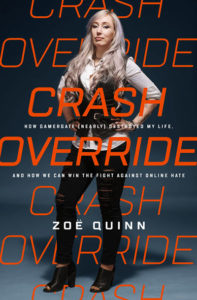
“Zoe Quinn is one of the most critically acclaimed, widely recognized indie developers in the gaming industry, and a leading voice in the fight against online abuse.” – Say what?
Robin TGG
As you most likely already know, Zoe Quinn (game developer, author and #GamerGate “survivor”) plans to release her #GamerGate book, “Crash Override: How Gamergate (Nearly) Destroyed My Life, and How We Can Win the Fight Against Online Hate”, sometime in September this year. So, what do you think about Quinn and her “Crash Override” book so far?
Source:
Amazon
Leavitt
My video on “GamerGate Round 2” went into some detail on my thoughts about this. Of course, I haven’t read the book yet as it has not been released, but my suspicion is that Zoe Quinn has learned a thing or two about self-promotion from her close association with Anita Sarkeesian. It may be that Quinn is positioning herself to use her tiny role as a catalyst in the creation of #GamerGate in hopes to catch the tail end of the publicity wave that the Tropes series stirred up. If it is really true that Sarkeesian is moving away from video games in favor of a new project, I could see Quinn trying to edge her way in to take her place as the face of Social Justice Activism within the Gaming sphere.
Of course, that’s just speculation, so we’ll have to see how this all plays out.
Robin TGG
Alternatively, there are books with the opposite or neutral viewpoint, such as James’ Desborough’s “Inside GamerGate” or Brad Glasgow’s book based on the events of GamerGate, where he reached out to GG to get some data on what they really think, respectively. What’s your take on these books in their attempt to show a different side to the argument to the norm?
Source:
James Desborough interview
Game Objective
Leavitt
I wasn’t aware of these books until you mentioned them here. It sounds like I need to check them out!
Robin TGG
Liana Kerzner’s Lady Bits series got fully funded (and then some) on Kickstarter just recently, and by the looks of it. Gamers are rather positive towards the series. So, what do you think about Lady Bits so far? (from what I understand, you have talked quite a bit with Kerzner in the past).
Source:
Liana Kerzner interview
Leavitt
I chanced upon Liana Kerzner’s work as a journalist and a game critic while I was seeking to better educate myself about the #GamerGate story. She and I have never met, but via our exchange of e-mails, our long Skype interview posted to both of our respective YouTube channels, and her YouTube series called “A Gamer’s Guide to Feminism”, I’ve developed a healthy respect for her insight and viewpoints. We don’t necessarily agree on everything, but we can enjoy a productive exchange of ideas and interact like adults. That is very refreshing and much-needed when it comes to topics as potentially incendiary as sexism, feminism, or social justice.
Furthermore, I’m confident that both her knowledge of gaming and of feminism runs circles around posers like Ms. Sarkeesian. So, I was happy to back her new “Lady Bits” series myself. I’m really looking forward to seeing what she’ll do with it!
Robin TGG
Since you have made a handful of #GamerGate related Youtube videos in the past (such as “Gamergate – Thoughts of a developer” and “GamerGate Round 2?”), what’s your personal take on the evolution of #GamerGate from 2014 to now? And do you think that MSM and the established games media have been fair to GG over the years?
Leavitt
For the most part, I feel like the Main Stream Media took the lazy route and reported on #GamerGate in only the most superficial and shallow of ways. They pandered to what they thought most of their consumers already suspected about video games and gamers. And hence, they did little more than reinforce what they thought their audience wanted to hear: That many gamers are basement dwelling weirdos who can’t get women to like them – so they detest and harass them instead.
Fortunately, there were some others who decided to dig a little deeper: journalists like Cathy Young, David Auerbach, Andrew Sullivan and David Pakman. All of these folks earned points in my eyes by what I saw was their brave counter-reporting to the mainstream narrative.
Right now, #GamerGate seems to be a bit of a sleeping giant to me. I don’t see that there is all that much going on with it at present. But I also suspect that it could be awakened again should Quinn’s new book incite another round of MSM attention.
Robin TGG
Do you think that the games industry has become better or worse since #GamerGate kicked-off back in 2014? (as in better ethics, games journalism and less corruption).
Source:
Brash Games blames their recent scandals on ex-writers and Opencritic?
Brash Games is an unethical train wreck that exploits their writers and much more – Ethics 101
The issue with reporting in video games
Leavitt
In this case, I agree with Nietzsche: “what doesn’t kill us, makes us stronger.” I think that games industry has mostly benefited from #GamerGate. I think this in large part because of how it fractured and weakened the established gaming press. I feel like we had a fair number of journalists who were reporting on games mostly as something they were doing until something better came along. I think that, at least some of them, may have been looking down on the audience they were supposed to be serving as somehow being beneath them. #GamerGate helped to expose those who were self-righteous in this way. Once those journalists were outed they tucked tail and ran. (I’m thinking of folks like Leigh Alexander and Samantha Allen.)
The journalists who are still with us seem to be more concerned with both games and with gaming news, rather than with pushing some kind of misguided cultural agenda aimed at reshaping the industry in their own image. Meanwhile, individual bloggers, Youtube critics, and genuine gamers who simply enjoy our marvelous medium of entertainment have swept in to take advantage of the turbulent waters.
So, in my estimation, #GamerGate while painful at time, on the whole proved to be a good thing.
Robin TGG
What’s your take on the fact that E3 is going to be open for everyone this year? (the established media won’t have a monopoly on what’s said, recorded and printed at E3 anymore).
Source:
PC Gamer
Leavitt
This may not be a popular position to take, but my opinion is that E3 has become less relevant as the years have passed. It now seems more to be like a gathering of fans and kind of a “cool place to be” than something that truly represents the inner-workings of the industry. Of course, there is still a lot of hype and excitement generated for various titles, but the proliferation of media outlets and marketing avenues makes E3 less important for networking and big announcements.
So, to me, the opening up of E3 this year is a continuation of this trend away from it being the nexus of gaming news for the year and towards it becoming more of a fan event. There’s nothing wrong with that, of course, but I don’t think that opening it up to the public is a big change so much as it is a natural evolution that we’ve seen developing over the past five or so years.
Robin TGG
Due to the fact that I’ve been playing video games since 1988, I simply haven’t been able to turn the blind eye to the hard truth that more and more games are broken on release nowadays. Why do you think that is? (you made a video on that topic last year, but perhaps you got something more to add to the matter today?).
Source:
Why Do Broken Games Get Released? A Behind the Screens Look
Leavitt
I think what I said in my video there is still pretty applicable. I also think that the Extra Credits piece released recently has some additional good insight.
The bottom line is derived from two factors. First, you have the marketing and business driven hype to release on a certain date, often to meet quarterly report expectations. And Second, you have the ability to patch most games now post-launch. These things conspire to encourage publishers to release games sooner than they should.
Hence, we get broken games (and, I still think the solution is to aggressively return any game that deeply disappoints you due to bugs or overhype. Returns are rough on publishers!).
Robin TGG
What do you as a Gamer and game developer think when you hear words such as “Microtransactions”, “pay-to-win”, “free-to-play”, “pre-order bonuses” and “paid-for DLC”?
Leavitt
I’m a Free-Market advocate and so I’m not particularly bothered, at least in principle, by these other methods of monetizing a game. I know that some of them can prove to be very lucrative for the publisher and, hence, that’s why they exist. (I spent a couple of weeks at Playdom shortly after the Disney buyout and saw up close how some of these things can work together.)
Personally, however, I almost never pre-order a game as I like to wait for reviews. And if I think that a game is going to try and soak me with upsells and micro-transactions, I’ll just go play something else instead. There are plenty of great titles to choose from these days, so I vote my wallet whenever I can.
Robin TGG
I’ve been following the crowd funding industry for many years now (especially when it comes to video games), and I can’t help to wonder when the crowd funding bubble will burst? Because there have been quite a few scams and disappointing projects in the past.
Source:
The risks of backing games on Kickstarter
Mighty No.9 backers still haven’t received their rewards?
Three months later Mighty no. 9 is still a failure
Leavitt
Yes, this does seem like a case of “buyer beware” situation. I don’t know that the bubble will burst, but I think that the viability of funding games in this way will wane somewhat as these projects come under closer scrutiny. Personally, I really like the idea of crowd-funding as it brings the developer closer to their audience. However, it is much easier to come up with a cool-sounding idea and promote it than it is to successfully execute on that idea. So, I think that the people who choose to participate in crowd-funding are going to start looking much more closely at the track record of the developer. Grand ideas are, in themselves, insufficient to carry a game through. Experience matters!
Robin TGG
I have written about 2,100 posts for TGG since May, 2014, and from then to now I have noticed that the amount of social activism has sky rocketed in the games industry (mainly in games journalism). So what’s your two cents on that topic?
Source:
Mighty no. 9´s former CM appears to have been trying to inject SJW and feminist politics into MN9
Dear “games journalists”, keep your social activism and fascism bs out of our games!
Abrams Tank appears to be trolling ResistJam?
GDC 2017 made me feel like game development isn’t even about games anymore
Leavitt
I’ve noticed this influx too. My sense of things is that much of it is a mirror of our society at large. I’ve been especially disappointed with how Social Justice Activism has infiltrated college campuses. I think we’ve simply seen some of that spill over into gaming journalism. Sadly, games aren’t immune to the culture wars.
That being said, I think that the trend in support of Social Justice Activism is now being recognized for what it is: self-righteous authoritarianism. I think that we’ll see it begin to decline as the arguments offered by the Social Justice Advocates simply don’t hold up well under scrutiny. Instead of engaging with their critics, they are trying to make it into a sort of a religion that regards any criticism or counterpoint as dangerous blasphemy. But this push to silence dissenting voices is actually a symptom that the movement is in trouble. It demonstrates that the SJW’s recognize that can’t argue their points on their merits, so they have to try and shut down their opposition lest the paucity of their position be exposed.
Ultimately, I think that games will come through this relatively unscathed – provided we gamers continue to buy what we like and shun what we don’t. In spite of all the sound and fury, the market will decide.
Justin TGG
Do you believe that the current relationship the video game industry has with the press can be mended? If so, how would we need to go about this?
Source:
The issue with reporting in video games
Leavitt
I think the relationship is already on the mend. Because Gaming Journalism is mostly about serving as a sort of a liaison between game publishers and game consumers, it relies a great deal upon those consumers being satisfied with the reporting. Unsatisfied consumers turn away from reporting that they don’t feel is accurate or fair. #GamerGate made it clear to many journalism outlets that they’ll lose consumers if they start trying to lecture or shame their readers rather than simply reporting on the facts. And so I think we saw a rather rapid correction as soon as readers started leaving the websites that were shaming gamers for simply enjoying their hobby. And, since then, I think that some of those same websites that used to be pretty harsh in attacking their own consumer-base have recognized the folly of their ways and are now trying to lure them back.
Justin TGG
It seems to me that the press and the general populace like to pick at gamers whenever the time arises, such as whenever a shooting happens or whenever someone wants to write that juicy clickbait. What do you think makes gamers an easy topic and how do you think gamers could put a stop to all the bad press?
Source:
Bethesda PR accidentally invites Kotaku to a Prey event, then immediately uninvites them?
Leavitt
This appears to be a continuation of the sort of scapegoating we’ve seen from the mainstream press for years. I think it’s worthwhile to remember that we’ve seen moral panics related to emerging forms of entertainment media for generations. Comic Books, Rock and Roll Music, Television, Movies, Dungeons and Dragons: They’ve all had their turn as Public Enemy #1.
It was only a decade ago that Violence in Video Games was considered a major threat and we had politicians like Hillary Clinton and Joe Lieberman warning of how dangerous it is and stumping for new legislation to “protect our children.” Now, thanks to folks like Anita Sarkeesian and Ashley Judd, sexist video games are a bit of a hot topic as they allegedly contribute to a culture of online harassment. This culminated with the UN Report on Cyber-Violence from September of 2015. Fortunately, when sane people got a look at how ridiculous and overbearing the proposed steps would be in order to curb the alleged problem, the threat suddenly seemed much less pressing. Hence, I think the “games make people sexist” moral panic is on the wane.
However, if I were to guess, I think that VR just might be the next source of trouble because now the sex and the violence is “too real” and, once again, someone will come out to try and save us from ourselves.
Justin TGG
Tell us about how you got into the video game industry. I’m sure you’d have some interesting stories to tell.
Leavitt
In my intro bit, I noted that I’m a life-long gamer. However, my kind of weird story of breaking in to the industry is that, in spite of being a self-taught programmer in High School, the programming classes at college back in the late ‘80’s were so boring (Pascal?!) that I washed out. I eventually graduated from college with an English degree instead of programming like I thought I would get. While I was going to school, I worked at Babbage’s (now Software Etc.) and sold home-built computers out of my apartment. So, I kept up on games and technology that way.
Anyway, shortly after graduating, I had some friends who were doing their own start-up game studio. They had their bases covered as far as the traditional game-making skills are concerned: art, programming, animation, audio, etc – but they were lacking someone to write the design documents, the technical specs, and the business proposals. So that was my first professional game job – as a technical document writer.
Since then, I’ve continued doing a lot of that sort of work: documentation, scheduling, spreadsheets, asset tracking, presentations, etc. I like to joke that I’ve made my career in games doing the jobs that no one else wants to do.

It takes a lot of hard work and dedication to become successful in the games industry. Then again, the same could be said about pretty much any other profession or industry as well.
Justin TGG
What are some of the hardships one can expect of getting a job in the video game industry?
Leavitt
I think the biggest hardship developers face is perpetual: the ever-present threat of long hours and crunch time. Being required to work late nights and weekends can really take a toll on you personally as well as make things very tough on your family too. I’ve seen many relationships fall apart under the strain of long months of persistent overtime.
Unfortunately, I don’t think there’s an easy solution to this problem. As I see it, the interactive and iterative nature of game design means that your products will always grow to fill the available time you have. Even with better management and planning, some amount of overtime has always been a part of the industry and probably always will be.
Time, quality, and money are all intimately related. Invariably, at some point in most projects you’re going to find yourself in a situation where you’re up against a deadline and there’s no more money to spend and nothing else that can give. And so you have to crunch to meet your delivery obligations. Now, I’ve heard rumors that sometimes a studio claims to have figured out a way to beat the overtime monster, but I’ve noticed that those studios rarely last. I’d be wary of any development studio that promises zero overtime. It might be that they don’t work overtime because they don’t have enough work to do in the first place.
So that’s my warning to anyone looking to get into the game industry – prepare for the high likelihood of overtime. You might be lucky and dodge it for a project or two, but at some point crunch is probably gonna get you.
Justin TGG
Do you have any advice to share with those who are looking for a way to get into the games industry? (giving these changing times of the way people see the industry, its media, and the like).
Leavitt
I think that most AAA developers are far more interested in what you can do to advance their projects than in your big ideas or your educational background. So, to that end, I advise folks looking to break in to create a portfolio of their best work and make that central in their application. Show, don’t tell, what you have to offer.
I don’t deny that going to school can be very helpful and may give you an edge for breaking in, but my sense is that the most impressive thing you can show a potential employer is proof that you know what you’re doing. So if you’re going to school to get into games, make absolutely sure that you’ll graduate with a game project under your belt that will put your skills in the best light possible.
Justin TGG
Is there anything you’re currently working on that you can tell us about? Seeing as how you are on hiatus to pursue personal projects.
Leavitt
Since mid-March, I’ve been doing some contract work with a local AAA game studio on a big and ambitious project. It’s a very cool opportunity and one that I didn’t want to pass up. My personal projects, (like my YouTube channel) have taken a back seat to that work. However, I’m under a Non-Disclosure Agreement, so I can’t say anything more about that just yet. That being said, as much as I enjoy working on big titles, I still have a real urge to do my own thing. I’m currently investigating ways that I can find to balance the two.
Robin TGG
What’s your plans, hopes and expectations for this year?
Leavitt
I’ve always enjoyed the work of the Independent development community and I play quite a lot of Indie games. Some really interesting and experimental stuff comes from the tighter focus that those games provide. Consequently, I’ve always wanted to try my hand at doing an Indie project or two myself. However, it is tricky to balance the demands of a large project and the non-compete agreements that the bigger publishers expect against the single-minded intense focus that an independent title needs.
So, right now, I’m working to negotiate something in my current contract work so that I might be able to split my time. Maybe I can swing it so that I can do a little of both. That seems like it could be the ideal situation! So, stay tuned!
![]()
Robin “V-Act” Ek
Editor in chief
The Gaming Ground
Twitter: @TheGamingGround
More by Robin Ek:
- The realistic survival game “The Last Plague: Blight” is coming to Steam EA on October 3rd, 2024
- “Final Fantasy Pixel Remaster Anniversary Edition” is coming physically to consoles on October 8th, 2024
- The single-button boss rush game “ONE BTN BOSSES” is now available for PC via Steam
- The unique viking base builder/roguelite/strategy game “Landnama” is now available for consoles
- The full version of “MARS 2120” is now available for PC and consoles
Tags: #GamerGate, E3 2017, Gamers, Games industry, Gaming, Troy Leavitt, Video games





